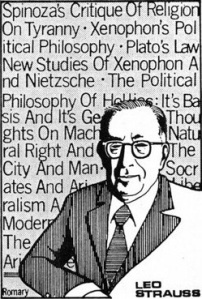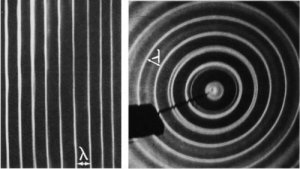Leone, Volpe …e Aquila
 It seems to be a common misconception that Leo Strauss inspired himself in Niccolo Machiaveli. In my view, that his thesis were influenced by the Florentine secretary is quite clear and Strauss himself wrote abundantly on Machiavelli but it is a misconception that neo-conservatism derives from the Machiavellian school.
It seems to be a common misconception that Leo Strauss inspired himself in Niccolo Machiaveli. In my view, that his thesis were influenced by the Florentine secretary is quite clear and Strauss himself wrote abundantly on Machiavelli but it is a misconception that neo-conservatism derives from the Machiavellian school.
There are many who enjoy writing on the similarities between the two, on when and how the American’s ideas were shaped by those of the Florentine. Regrettably, scholars and researchers seldom take the time to consider what sets them apart. There are even those who go as far as to have difficulty in setting them apart, not trying to hide an ill-considered admiration for both…
First and foremost the academia might like to start with the moral considerations Leo Strauss made of Machiavelli. The secretary was often complemented in Strauss’s work for his brilliance and revolutionary ideas, for the pioneering rationale of his thought. That being said, Machiavelli’s groundbreaking thought aside, Strauss often used the Machiavellian school to mark a contrast with the proposed theories which he himself advocated.
For Strauss after all, Machiavelli represented the foundation of the very philosophical forces which neoconservatism was being conceived to fight. Machiavellian ethics had been insidiously crucial to the separation of Church and State, to the advent of liberalism but the Machiavellian teachings also marked the original sin of the liberal school in so far as it carried with it the nihilist gene for Nietzschean social disintegration.
This alone ought to give pause for those who are too eager to precipitously establish the analogy between the two thinkers. However, there are other aspects. One in particular will be addressed, for in today’s post-modern societies it is one of the most controversial: deception.
I assert that Leo Strauss reified the term.
Many neocons are not religious but in spite of this they are prominent thinkers of the GOP and the religious right, in America. The reason for this is the straussian belief in the need for Machiavellian methods in the triumph of good against evil. For the neoconservatives, society is to be a consensus of morality since only morality can check the inherently subversive forces of liberalism. Social morality therefore is a necessary fiction meant to preserve society as a cohesive compact; and the neoconservative pundits are thus comfortable in their respective advisory roles.
This logic however perverts the Machiavellian rationale and it does so in two different ways: on one hand it applies to society, precepts advised for the political leadership, on the other hand it mistakes ends with means.
‘Il Principe’ was meant for a statesman, it taught the natural need for pragmatism and cold calculism in politics but Strauss’s interpretation of Machiavellian deception is erroneous in its assumption that deception can be equated to myth. Both imply deceit but only the latter can be messianic. Strauss as an American naturally tends to understand deception as a mechanism for condescending fiction, a natural emulation of the Founding Fathers’ legacy. This is dangerous and it reveals the bias of a national of an ideological empire. Only a national of a new country which has known but one guiding regime ideology can misunderstand the teachings of a renaissance sceptic ideologue, only he can interpret a historically empirical observation as an instrument for the service of a specific normative doctrine. The danger comes from the inherent potential for social engineering. Machiavelli was not writing a utopia, he was not prescribing the parameters for the perfect society – he was advising a political leader not a social worker.
For Machiavelli attitudes such as cruelty or charisma are nothing but instruments for the wielding of power:
‘A wise prince will seek means by which his subjects will always and in every possible condition of things have need of his government and then they will always be faithful to him’.
For Strauss these attitudes are not supposed to serve the leader or the state but rather the contemporary and not yet corrupted form of liberal society.
In Strauss, Machiavelli’s means – justified by the ends – are instead ends in themselves. The straussian deception is the fiction of the moral society. This fiction/deception/myth is both the means and the end of the urgent preservation of liberalism from its nihilistic tendencies. Straussian doctrine exists as chronological exception whereas Machiavellian doctrine exists as historical normality. The former is based on a linear perspective of history with democratic liberalism at the top of human socio-political evolution, the latter is based on an empirical and circular vision of history where human behaviour is by and large a constant.
On the necessary qualities to feign for the benefit of the masses, the Prince is advised by Machiavelli to primarily feign piety and morality. Of course it is one thing to keep the masses convinced of their leader’s moral superiority, it is another altogether to transform the masses themselves into an amorphous morally compliant throng.
The Cosmopolitan Circumstance of Realism
To continue the topic on geography, we’ll discuss how realism and idealism differ in geographic circumstance, how tolerance and relativism are more prevalent in some areas, and how the tendency for absolutes and proselytism abounds in others.

Asians possess a cyclical concept of history, Westerners possess a linear one.
The nature of secular statehood, is found quite early on when Christians refused to acknowledge the divinity of the Roman polytheistic emperor. As Christian kings emerged throughout the former Roman Empire, the already established church recognised – in the west – only the pope as a “messenger” from the now one god.
As opposed to the other faiths where the prince led the theological revolutions, the Christians inherited the Jewish legacy of a transnational faith. While the Jews resorted to such a solution in order to preserve their national culture whilst in exile, the Christians unwittingly or otherwise, used this philosophical idiosyncrasy to effectively subvert the Roman Empire. The Jewish secretive and endogamic liturgy had been designed to outlast the secular power so that the minority’s culture could be preserved. The Christians however, perverted this purpose by adopting Greek and later on Latin as liturgical languages – instead of Hebrew – and in effect expanding the methodology of a recluse and transnational faith to entire sections of the Hellenic and Latin majorities – mainstream ethnicity of the Empire.
Thus the birth of the modern western secular separation of church and state that was consolidated in 1648, has its roots in antiquity, with the promiscuity between incompatible structural faiths. The monotheism of the Jewish protectorate of the Roman Empire was not conceived as an imperial and all encompassing system and the proof that it was badly adapted remains the perpetual fragmentation of the so called Respublica Christiana. In other words, a less tolerant and more absolutist doctrine, deriving from an outcast, relatively marginal and peripheral people, contaminated a tolerant and pragmatic polity contributing to its downfall.
If one were to bear in mind the history of Political-Realism, the classic authors that inspired this modern school of thought, one would clearly realise that they all become pragmatic out of necessity and not through some gratuitous gospel of good intentions. Concurrently, Machiavelli, Bismarck, Morgenthau or Kissinger, were all working at the centre of their respective geopolitical worlds when they realised that only a pragmatic approach that separated morals from politics and emphasised machtpolitik, could ensure their respective governments success.
The idealists originate in a different spectrum. For it was the Scottish liberal school that gave birth to some of the most influential idealist classical authors that are revered today such as Smith or Hume, and lest we forget, Scotland was much more pervasive in religious colonisation of America than England. The jihadists for example, find their ideological justification in the Salafi doctrine, of which the Saudi Wahhabi branch is a particular extremist source. Where did the Wahhabis come from, in the Arabian peninsula? Not from the southeast where the merchants were based, but rather from the central and northeastern deserts near the Iraqi border, and also one of the most isolated areas of the Mashrek. Similarly, English philosophers have differed from Scottish ones in terms of idealism. Granted that we’ll find pragmatists and idealists everywhere but it is a constant of international politics that the least cosmopolitan are the ones who argue for more unilateral and moral solutions.
Isn’t it a marvellous quirk of events, that the Neocons and the militant Salafi – both with puritan and iconoclastic philosophical origins – brewed a conflict against each other? Is it perhaps a coincidence that the states that most easily integrated the Coalition of the Willing in 2003 and trusted US arguments, were also peripheral – east and central European states also did but their reasoning had something of a russophobe flavour to it – European states?
In fact, the most atlanticist sentiment is today found in Scandinavia, the British isles, the low countries and the Iberian peninsula – the most sceptical about atlanticism being located in continental Europe. Incidentally, these regions are also the most exceptionalist: evangelical-Lutheranism in Scandinavia, Anglicans in England, Presbyterians in Scotland, very conservative Catholics in Ireland and the Iberian peninsula. The Porvoo Communion for example, clearly separates these regions from continental Protestantism. Likewise, Catholicism in Spain is a patriotic value (perhaps we could include Italy) which is in great contrast with continental Europe.
It is pertinent to ascertain what is peripheral and what is central. The Arabian peninsula is globally central but it is a peninsula. If one adds deserts to the equation, its centrality diminishes. Likewise, the British Isles have been an integral part of European geopolitics for millennia but they are isles. Scotland and Switzerland are dynamic and very commercial but they remain topographically more distant than other regions, to the centre of Europe. The Americas are a continent and the US are in many ways the centre of the world. That does not prevent the Americas from being an isolated continent.
It is not a coincidence for example that the providential strong men that emerge and carry out universalist doctrines, come very often from the periphery of the polity in question. It happened with Napoleon (Corsica) as it happened with Hitler (Bavarian-Austrian border) or Trotsky (Ukrainian Crimea).
These constants serve as a reminder: the fringes do not argue for relativism and tolerance because they do not know the need, their historical experience is one of self involvement and based on an exceptionalist and often messianic narrative.
Realists are the by-product of cosmopolitism, of the need to tolerate in order to prosper, of the application of scientific methods in spite of the established political correctness and morality.
Important: Please note that this article represents property of the author only. It is not permitted to copy nor/and use the article without previous consultations with the author. Thank you.
